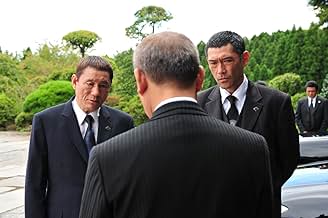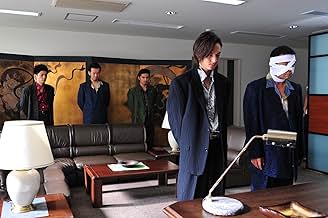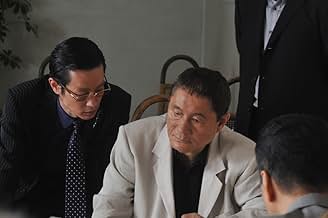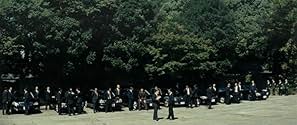El jefe de un importante sindicato del crimen le ordena a un hombre acabar con una banda de traficantes de drogas.El jefe de un importante sindicato del crimen le ordena a un hombre acabar con una banda de traficantes de drogas.El jefe de un importante sindicato del crimen le ordena a un hombre acabar con una banda de traficantes de drogas.
- Dirección
- Guionista
- Elenco
- Premios
- 1 nominación en total
- Ôtomo
- (as Beat Takeshi)
- Dirección
- Guionista
- Todo el elenco y el equipo
- Producción, taquilla y más en IMDbPro
Argumento
¿Sabías que…?
- TriviaFollowing a string of unconventional, commercially unappealing films, Takeshi Kitano engineered this film specifically as commercially appealing, going back to the genre which brought him the most success, and going as far as imagining the death scenes first and writing a story around them later.
- Citas
Ikemoto: H-h-hold on a minute...
[panting]
Ikemoto: I'll reverse the banishment.
Ôtomo: Huh?
Ikemoto: I'll reverse the banishment.
Ôtomo: You banish me, then you reverse it?
[explodes]
Ôtomo: How many fucking tongues do you have?
Ikemoto: Huh?
Ôtomo: Are you deaf? How many do you have?
Ikemoto: I've only got one.
Ôtomo: Only one? *Two* or *three* is more like it, you fucking prick!
Ikemoto: I'm telling you I've only got one tongue!
Ôtomo: [a little calmer] Open your mouth.
[louder]
Ôtomo: Stick out your tongue!
Ikemoto: [beat] Huh?
Ôtomo: [barking] Stick out your tongue!
[Ikemoto reveals reluctantly a bit of his tongue]
Ôtomo: MORE!
[Ikemoto does]
Ôtomo: STICK IT OUT, YOU MOTHERFUCKER!
[Ikemoto sticks out his entire tongue, then Otomo slams his jaw so violently that Ikemoto bites through his own tongue; Otomo then shoots him]
- ConexionesFeatured in Ebert Presents: At the Movies: Episode #2.18 (2011)
There are random acts of extreme violence that continue to propel the plot forward. Kitano, playing the underboss Otomo, is a similar role to his other characters in yakuza movies which portray out of control individuals that have a minor standing yet have the last word at the end of the play. Rather than focusing on the beauty of mobsters hiding out on the beach, this is a gritty, urban drama much in the tradition of Johnnie To's triad movies (Election) that has dominated the organized crime dramas over the past decade.
In showing the criminality of the human mind, it evokes Mario Bava's study in Rabid Dogs, similarly Kitano is building a Brechtian inspired drama about the harsh existential life. Kitano continues to explain and further define his worldview through the character of a doomed nihilist anti-hero. In all of Kitano's yakuza character studies, there is no hope, or redemption, only a further plunge into an ugly existence of lies and deceit, where only an act of violence can bring about change.
As Kitano remarked publicly about his making of Outrage, he is giving the people what they want - no pretense of artistic embellishments, but rather blunt, cruel acts of violence of the professional criminal devoid of any romanticism. One scene in particular evokes The Godfather, but that is where the similarities end - there is nothing glamorous about the yakuza lifestyle.
In this film, Kitano assumes the duties as in his other yakuza films as that of star, director, editor and writer. The vision is completely his own. The pacing is deliberately slow, showing that the life of a criminal is not particularly exciting but rather mundane as that of any other type of businessman, mostly involving allegiances of convenience and acts of betrayal. There is no illumination or redemption here, no course of action will lead to a better life, such is the basic tenet of a nihilist.
There is little flourish in the direction such as to immerse the viewer into the dark, banal existence of its characters. The one scene that brings a sense of relief with sunlight streaming through the trees on a backstreet, is colored darkly by seemingly innocent activity that is actually quite sinister for the individuals involved.
This is a welcome and long overdue return for Kitano to the yakuza genre which he abandoned a decade ago for a trilogy of felliniesque introspective autobiographical films. There are no experimental sequences or absurdist imagery as in his previous films. As a consequence, Kitano is no longer held back with meditative musings, instead giving the viewer an unfiltered take on the corruption, lies, and phony existence of the individual in an artificial society - that any person in any social situation is merely part of an inauthentic social contract.
In many ways, the lack of artistic pretense in Outrage only serves to further embolden the bleak message that Kitano has for us. This is not a film for the weak of heart, nor is it one for the impatient, it is a slow revelation revealing the emptiness of life and the pointlessness of all action.
- joeydoa
- 19 dic 2010
- Enlace permanente
Selecciones populares
- How long is Outrage?Con tecnología de Alexa
Detalles
- Fecha de lanzamiento
- País de origen
- Sitios oficiales
- Idiomas
- También se conoce como
- Outrage
- Locaciones de filmación
- Chuo-ku, Tokio, Japón(Exterior)
- Productoras
- Ver más créditos de la compañía en IMDbPro
Taquilla
- Total en EE. UU. y Canadá
- USD 44,745
- Fin de semana de estreno en EE. UU. y Canadá
- USD 6,518
- 4 dic 2011
- Total a nivel mundial
- USD 8,457,741
- Tiempo de ejecución1 hora 49 minutos
- Color
- Mezcla de sonido
- Relación de aspecto
- 2.35 : 1
Contribuir a esta página


























